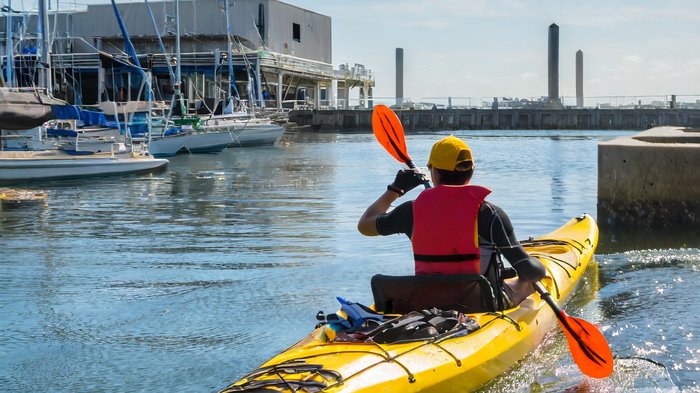
Aarhus City is home to one of Northern Europe's biggest harbors and is Denmark’s largest commercial port. Aarhus harbor has a big responsibility for sustainability and sustainable transformation and adopted several measures to make the harbor itself cleaner and more environmentally friendly.
One of these measures are called city sharks., a range of water drones funded and operated by the municipality in Aarhus. The drones were primarily built to autonomously collect garbage from the water's surface.
The City Shark project was divided into three phases, where the first phase included developing the WasteShark drone to collect garbage. The next phase included the combination of a WasteShark drone and a satellite-controlled air drone. Even small amounts of oil and petrol could be detected from the sky and the water drone was steered to collect these on the water surface. In the last phase, a sonar (sound navigation and ranging) was installed under the water drone. This sonar helped create a 3D-model of the seabed to localize changes at the bottom of the sea and monitor water temperature and quality. The prototypes of city sharks represent technological solutions to contribute to cleaner environment as well as they pioneer data collection for previously unknown areas that can contribute to better decision-making and risk prevention.
Another measure to engage citizens in the protection of the environment is green kayaking, a sustainable outdoor activity supported by the NGO "Paddle for Preservation." The initiative encourages citizens to actively engage in preserving Denmark's aquatic ecosystems. Participants utilize eco-friendly kayaks and gear crafted from recycled materials, minimizing their carbon footprint while exploring the many waterways of the country. "Paddle for Preservation" goes beyond recreation, though, as they are organizing citizen-led clean-up events to remove litter from water bodies and educate the public on eco-conscious practices. This initiative empowers citizens to take an active role in protecting nature. The initiative is also present in other countries like Norway, Sweden, Germany, and Japan. All in all, 66,817 people have tried Green Kayaks and collected more than 104 tons of ocean waste.
(MB)
Literature:
Boucher, Stephen; Hallin, Carina Antonia; Paulson, Lex (eds.) (2023). The Routledge Handbook of Collective Intelligence for Democracy and Governance. London: Routledge. https://dx.doi.org/10.4324/9781003215929